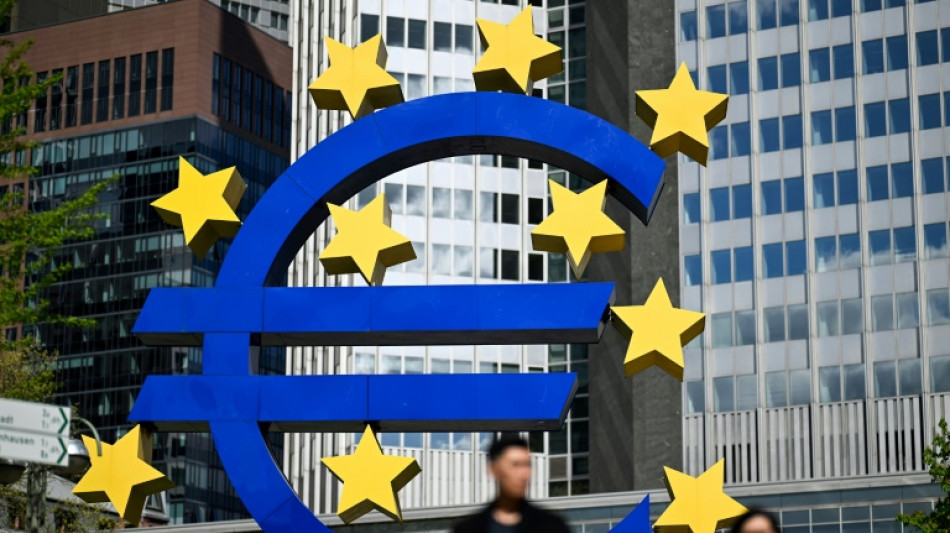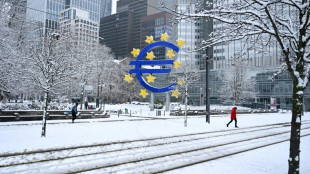
-
 Ice dancers Chock and Bates shine as US lead Japan in team event
Ice dancers Chock and Bates shine as US lead Japan in team event
-
Stellantis takes massive hit on 'overestimation' of EV demand

-
 Stocks rebound though tech stocks still suffer
Stocks rebound though tech stocks still suffer
-
Spanish PM urges caution as fresh rain heads for flood zone

-
 Iran says to hold more talks with US despite Trump military threats
Iran says to hold more talks with US despite Trump military threats
-
Russia accuses Kyiv of gun attack on army general in Moscow

-
 Cambodia reveals damage to UNESCO-listed temple after Thailand clashes
Cambodia reveals damage to UNESCO-listed temple after Thailand clashes
-
Norway crown princess 'deeply regrets' Epstein friendship

-
 Italy set for Winter Olympics opening ceremony as Vonn passes test
Italy set for Winter Olympics opening ceremony as Vonn passes test
-
England's Jacks says players back under-fire skipper Brook '100 percent'

-
 Carrick relishing Frank reunion as Man Utd host Spurs
Carrick relishing Frank reunion as Man Utd host Spurs
-
Farrell keeps the faith in Irish still being at rugby's top table

-
 Meloni, Vance hail 'shared values' amid pre-Olympic protests
Meloni, Vance hail 'shared values' amid pre-Olympic protests
-
Olympic freestyle champion Gremaud says passion for skiing carried her through dark times

-
 US urges new three-way nuclear deal with Russia and China
US urges new three-way nuclear deal with Russia and China
-
Indonesia landslide death toll rises to 74

-
 Hemetsberger a 'happy psychopath' after final downhill training
Hemetsberger a 'happy psychopath' after final downhill training
-
Suicide blast at Islamabad mosque kills at least 31, wounds over 130

-
 Elton John accuses UK tabloids publisher of 'abhorrent' privacy breaches
Elton John accuses UK tabloids publisher of 'abhorrent' privacy breaches
-
Lindsey Vonn completes first downhill training run at Winter Olympics

-
 Digital euro delay could leave Europe vulnerable, ECB warns
Digital euro delay could leave Europe vulnerable, ECB warns
-
Feyi-Waboso out of England's Six Nations opener against Wales

-
 Newcastle manager Howe pleads for Woltemade patience
Newcastle manager Howe pleads for Woltemade patience
-
German exports to US plunge as tariffs exact heavy cost

-
 Portugal heads for presidential vote, fretting over storms and far-right
Portugal heads for presidential vote, fretting over storms and far-right
-
Suicide blast at Islamabad mosque kills at least 30, wounds over 130: police

-
 Russia says Kyiv behind Moscow shooting of army general
Russia says Kyiv behind Moscow shooting of army general
-
Greenland villagers focus on 'normal life' amid stress of US threat

-
 Iran, US hold talks in Oman after Trump military threats
Iran, US hold talks in Oman after Trump military threats
-
Stocks waver as tech worries build

-
 Dupont, Jalibert click to give France extra spark in Six Nations bid
Dupont, Jalibert click to give France extra spark in Six Nations bid
-
'Excited' Scots out to prove they deserve T20 World Cup call-up

-
 EU tells TikTok to change 'addictive' design
EU tells TikTok to change 'addictive' design
-
India captain admits 'there will be nerves' at home T20 World Cup

-
 Stellantis takes massive hit for 'overestimation' of EV shift
Stellantis takes massive hit for 'overestimation' of EV shift
-
'Mona's Eyes': how an obscure French art historian swept the globe

-
 Iran, US hold talks in Oman
Iran, US hold talks in Oman
-
Iran, US hold talks in Oman after deadly protest crackdown

-
 In Finland's forests, soldiers re-learn how to lay anti-personnel mines
In Finland's forests, soldiers re-learn how to lay anti-personnel mines
-
Israeli president visits Australia after Bondi Beach attack

-
 In Dakar fishing village, surfing entices girls back to school
In Dakar fishing village, surfing entices girls back to school
-
Lakers rally to beat Sixers despite Doncic injury

-
 Russian pensioners turn to soup kitchen as war economy stutters
Russian pensioners turn to soup kitchen as war economy stutters
-
Japan taps Meta to help search for abuse of Olympic athletes

-
 As Estonia schools phase out Russian, many families struggle
As Estonia schools phase out Russian, many families struggle
-
Toyota names new CEO, hikes profit forecasts

-
 Next in Putin's sights? Estonia town stuck between two worlds
Next in Putin's sights? Estonia town stuck between two worlds
-
Family of US news anchor's missing mother renews plea to kidnappers

-
 Spin woes, injury and poor form dog Australia for T20 World Cup
Spin woes, injury and poor form dog Australia for T20 World Cup
-
Japan's Liberal Democratic Party: an election bulldozer


ECB's digital euro sparks flurry of online misinformation
European Central Bank president Christine Lagarde's recent remarks on a "digital euro" prompted a fresh wave of misinformation online, highlighting an uphill battle ahead to convince the public of the project's merits.
The decision to create a digital euro -- essentially an electronic form of cash backed by the ECB -- has not been made yet and any possible launch would be years away.
But when Lagarde in a press conference this month referenced an October 2025 deadline for moving to the next stage of preparations, social media lit up with alarmed messages that the launch was imminent.
Harald Vilimsky, a member of the European Parliament from Austria's far-right Freedom Party (FPOe), was among those posting that the ECB "wants to introduce the digital euro in October", an incorrect claim that spread in several languages.
The claim was echoed on X by Nicolas Dupont-Aignan, the eurosceptic head of the Rise Up France party, who added that the project was "madness for our freedoms".
Other widely shared posts repeated misconceptions that have long dogged the project: that a digital euro would mean the "end of cash" or be used for financial surveillance, allowing the ECB to "block" or "track" payments or "access savings".
"Your money will no longer be yours," alleged a French TikTok video shared more than 15,000 times.
The falsehoods circulating online reveal a broader "mistrust of centralised institutions", said Vicky Van Eyck, executive director of campaign group Positive Money Europe.
Recent comments by French President Emmanuel Macron and European Commission chief Ursula von der Leyen about investment needs were similarly misused in viral posts that falsely claimed people's savings would be taken from them.
- 'Strategic autonomy' -
The ECB and dozens of other central banks worldwide are exploring or putting in place central bank digital currencies (CBDCs) as cash use declines.
Conspiracy theories about governments planning cashless societies as way of controlling citizens have proliferated since the Covid-19 pandemic, but ECB officials have been at pains to stress that a digital euro would complement cash -- not replace it.
Issued by the ECB, the money would be risk-free. It would be held in a digital wallet and payments could be made online or offline, allowing for cash-like anonymity. The ECB says it would not be able to directly link transactions to specific individuals.
In making the case for a digital euro, the ECB argues that it would bolster Europe's "strategic autonomy".
A digital euro would allow for direct money transfers between users, offering a pan-European payment service that could reduce reliance on US payment giants such as Mastercard, Visa, Apple Pay or PayPal.
"This dependence exposes Europe to risks of economic pressure and coercion," ECB chief economist Philip Lane warned last week, in a nod to transatlantic tensions under US President Donald Trump.
Lane said a digital euro could also counter the influence of increasingly popular dollar-backed "stablecoins" -- private digital currencies that are pegged to the US dollar and could undermine the euro if widely adopted in Europe.
- Challenges -
Some observers remain critical.
Ignazio Angeloni, a former ECB official and currently a fellow at Milan's Bocconi University, said Europeans already had "a plethora" of easy payment options and weren't necessarily looking for another.
For now, the digital euro discussions were still at a fairly technical stage, Angeloni said, and many members of the public were "not interested".
Van Eyck said interest could be hindered by plans to cap how many digital euros consumers could hold.
An ECB report published in March found that between 2022 and 2024, awareness about the digital euro jumped from 18 to 40 percent among eurozone survey respondents. The potential willingness to use it remained below 50 percent.
The decision to issue a digital euro will only come once European Union legislation is in place, but progress in Brussels has been slow.
If adopted, a digital euro would be introduced from mid-2027 or 2028 at the earliest, officials told AFP.
Good communication with the public will be key to its success, said Van Eyck.
"The big issue with not having the public on board is that the digital euro could flop," she said.
X.AbuJaber--SF-PST
